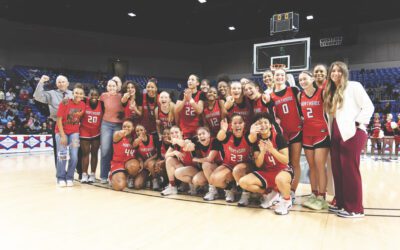June is Alzheimer’s and Brain Awareness month. Melissa Curry, CEO of Methodist Village Senior Living in Fort Smith, shares her story.
On a Saturday morning when teenaged Melissa Curry was far too young to handle a crisis, she drove to her grandmother’s house in Hartman, Arkansas. She’d come to take Grandma Laura to Piggly Wiggly, as she did every weekend. But when Melissa arrived, she found an imposter.
“Grandma opened the screen door. She was wearing orange polyester pants, a white button-down shirt, Mardi Gras beads,” Melissa says. “She’d taken a box of orange Jello and rubbed the powder on her cheeks. Her white hair, always in a bun, was down.”
Melissa’s grandmother, a devout Pentecostal, didn’t wear pants. She didn’t wear make-up. She certainly didn’t wear Mardi Gras beads.
There had been a few signs that her grandmother was having memory problems, but nothing that was cause for alarm, so Melissa didn’t have reason to worry. She laughed when her grandmother opened the door, thinking the new look must be a joke. But when her grandmother spoke, this is what she said: “‘I need you to take me down to Pluggies so I can fetch me a fella.'” Pluggies was a store where the men in town gathered to people-watch.
“I talked her into going to Piggly Wiggly instead. I’m seventeen, a young girl, so embarrassed. I remember pushing the cart, trying to get everything as fast as I could. Every man we passed, she’d go up to. ‘Hi, honey. How ya doin’?’”
Grandma even flirted with the teen boy sacking groceries. Melissa was in tears on the way back. She unloaded the bags, trying to make sense of the morning. Her grandmother disappeared into the bathroom. When she returned, she had questions.
“She called me Baby Blue. She said, ‘Baby Blue, why am I wearing these pants?'” Wanting to spare her grandmother’s feelings, Melissa answered, “I think you were going to work in the garden.” But even when she worked outdoors, she wore a skirt hitched up between her calves, secured – the hallmark of a religious farmwoman of a certain age.
“My grandmother looked at me and said, ‘Oh yeah, that’s right.’ And I knew at that moment she didn’t know why she had those pants on. I cried all the way home. I decided not to wait until Saturday to see her again. I told her I’d pick her up for church on Wednesday night. When I came to the door, her hair was up. She had a dress on. I said, ‘Praise the Lord.’ We got back home, and she said, ‘You know what, Baby Blue, somebody’s been breaking into my house. They’re stealing stuff. Then they’re coming back at night and putting it someplace else.'”
Melissa wiped away tears as she drove home. She called her mom to tell her something was very wrong. They made a doctor’s appointment and learned that Grandma had dementia, which was likely Alzheimer’s disease. At that time, Alzheimer’s was a relatively new word. People would say Old Timer’s disease or hardening of the arteries.
Melissa spent hours at the library researching dementia. She volunteered at the Johnson County Nursing Home, finding out all she could about the aging process.
Melissa’s grandmother lived for eighteen more years in the care of her family, and two kind women the family hired to live with her. She died on a Christmas morning.
During those years, Melissa learned how to love someone who was fading away. When her grandmother saw a giant chicken in her house, Melissa would pretend to shoo it away. When her grandmother became agitated, Melissa would soothe her by redirecting her. She doesn’t understand how she intuitively knew what to do except for this: “God was with me.”
In the years that followed, Melissa worked with the Alzheimer’s Association. She trained Alzheimer’s professionals in multiple states. Melissa has studied the disease for a quarter of a century, becoming one of only a handful of certified dementia care managers in the nation. As CEO of Methodist Village Senior Living in Fort Smith, she oversaw the multi-million-dollar expansion that included an Alzheimer’s Special Care Unit.
Alzheimer’s is an incurable brain disease that grows worse as time marches on. The brain shrinks, and brain cells die. Changes can be gradual. Forgotten conversations, losing things, repeating questions, changes in grooming and hygiene, problems with balance, and getting lost. At first, the person affected is aware that something’s amiss, and it’s frightening for them.
Other symptoms might be changes in behavior and personality, such as Melissa’s grandmother’s experience. Reasoning and decision-making can become difficult. And the person’s perception of money can change dramatically. “They might go in a high-dollar store and buy a sweater for $900, thinking that’s normal.”
Early testing is essential. Other causes of memory loss include interactions with medicines or supplements. Even urinary tract infections, particularly in women, can cause confusion because they increase ammonia in the brain.
In the United States, there are approximately 7 million people older than sixty-five with Alzheimer’s disease. More than seventy percent of that group are over seventy-five. In Arkansas, as of 2020, the number was 60,400, or eleven percent of residents older than sixty-five.
The number of caregivers in the state is 155,000—11 million nationwide—most of whom are family members. Nearly seventy-three percent of them have chronic health conditions, with thirty-eight percent reporting bouts of depression.
Melissa cited an even more startling statistic. “Sixty-seven percent of caregivers die first. It’s so mentally, physically, emotionally, and spiritually draining.
“My best advice is, after the diagnosis, find a support group. Don’t be embarrassed. Dementia is an organ disease, not a mental illness. Millions of others are going through the same thing as you.”
Years ago, Melissa met a woman who was caring for her husband. She slept in a recliner pushed against the front door, so she’d wake in case he tried to wander off at night. The back door was nailed shut; it was a dangerous situation. She even bathed with the bathroom door open to keep an eye on him. He wanted to go home, not realizing he was already there. In his recollection, he was a much younger person living in an entirely different house.
“When I did support groups, I knew which ones weren’t taking care of themselves. These ladies would come in with roots showing. They didn’t have time to dye their hair, not even when they did it themselves.”
The subject hits even closer to home these days. Melissa’s father, the strong, brilliant head of their household, is coping with the disease. He’s at home with Melissa’s mom, doing well, considering. Her mother loves having him close. The family helps, and Melissa keeps a close eye, looking for any sign that her mom is overwhelmed.
“My dad and I are so much alike. We’re driven. Sometimes, it feels like I’m waiting on the inevitable. I’ll forget a word during a conversation and wonder. But just because my dad and grandmother had the disease, it doesn’t mean I will. Even if I got genetic testing that was positive, it would only mean I had a greater chance.”
The grand hope is for a cure. Until then, some treatments can temporarily improve symptoms, with even more in development. Research shows that exercising and eating a heart-healthy diet may help prevent or delay Alzheimer’s disease.
Melissa was far too young when she found her grandmother at the screen door, so unfamiliar she could have been a stranger. Melissa could have run away, called her mother, gone for a drive to clear her head. But that troublesome Saturday, in the aisles of Piggly Wiggly, Melissa felt something elemental shift. She believes God allowed the experience to open her eyes. There were people she could help, people whose fate she understood. Sometimes, you find your calling after a long and winding search. But sometimes, your calling finds you.
***
Alzheimer’s disease is the most common cause of dementia, accounting for 60-80% of cases. ~ Natalie Jordan, MD, Baptist Health
After the age of 65, the risk of Alzheimer’s Disease doubles every 5 years. By 85 years of age, there’s a 1/3 chance of having Alzheimer’s disease. ~ Natalie Jordan, MD, Baptist Health
Controllable Risk Factors: preventing falls, preventing head injuries (wearing seat belts, wearing helmets during sports), controlling medical conditions, including high cholesterol, heart disease, high blood pressure (hypertension), and diabetes mellitus are important to mitigating disease burden. Exercise, eating a healthy diet, avoiding tobacco use, minimizing alcohol use, staying socially active, and having spiritual wellness each contribute to overall healthy aging and minimize risk of dementia. ~ Natalie Jordan, MD, Baptist Health
Alzheimer’s national hotline, 800.272.3900, available 24/7.
More information is available at alz.org.
CAREGIVER SUPPORT GROUPS
Methodist Village Senior Living
1st Tuesday, 10:30a
4th Thursday, 5:30p
7425 Euper Lane, Fort Smith
Fort Smith Alzheimer’s Support Group
2nd Thursday, 4p
Blue Cross, Blue Shield
3501 Old Greenwood Rd., Fort Smith
Van Buren Alzheimer’s Support Group
2nd Wednesday, 6p
Legacy Heights
1012 Fayetteville Rd., Van Buren
WORDS Marla Cantrell
IMAGES courtesy Melissa Curry




